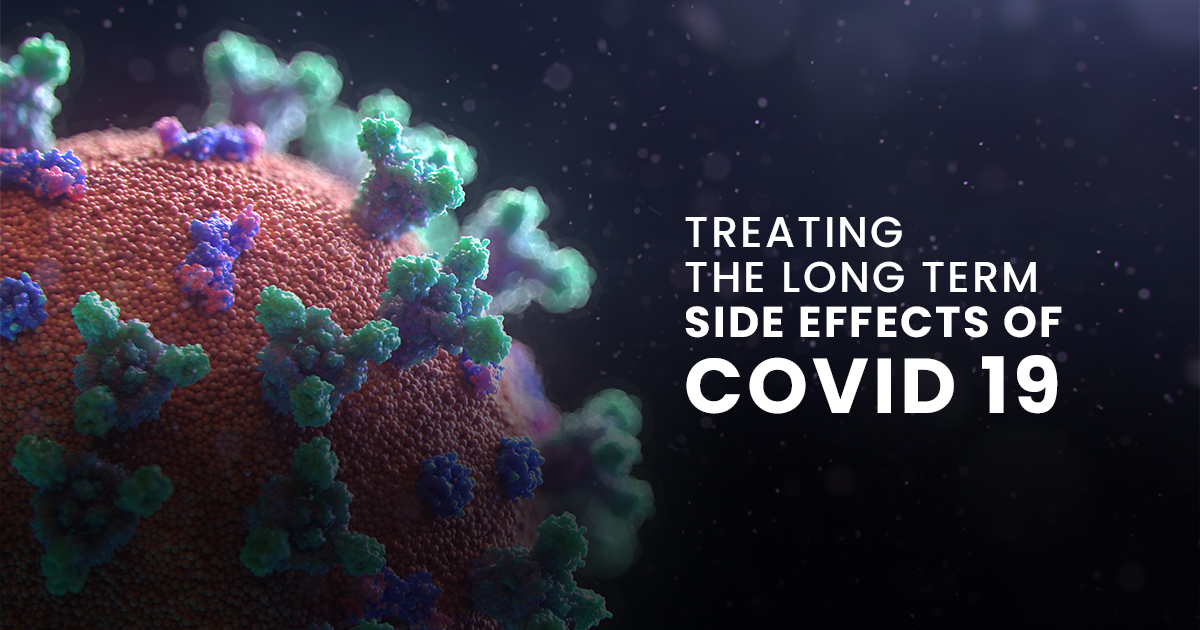A Lot of information has surfaced in the study of treating the long-term side effects of COVID-19 since its earlier stages of research. Much effort has gone into organizing this complex data while more answers are yet to surface. A bit of advice common to all who know better: Seek professional guidance under all circumstances.
Several terms refer to post COVID conditions or persistent Coronavirus. Here are most of the common ones:
- Long COVID
- Long-haul COVID
- Post-acute COVID
- Post-acute sequelae of SARS-CoV-2 infection (PASC)
- Chronic COVID-19
- Post-COVID syndrome
Persistent COVID-19 has been defined as 12+ weeks of symptoms during or after experiencing symptoms not explained by another diagnosis.
Common Long-Term Side Effects of COVID-19
Those treating the long-term side effects of COVID-19 have observed that the longest-lasting symptom is fatigue. Following close behind are Dyspnea, chest discomfort, cough, and no smell or taste. There is a long list of other physical symptoms that trail.
There have also been common neurological symptoms, including anxiety or depression, post-traumatic stress disorder, impaired memory, and poor concentration.
Actual incidents of SARS-CoV-2 have lessened. However, post-COVID effects seem to have increased.
Post-COVID Syndrome
Research up to this point has led to the need to determine appropriate measures in treating the long-term side effects of COVID-19.
One determination seems to be that physicians require those hospitalized for SARS-CoV-2 to follow up within one week.
It has been suggested SARS-CoV outpatients without hospitalization should schedule a follow-up within about three weeks. This applies particularly to older patients (60 years of age or older) or those with other diagnoses. These visits should include a discussion of the previous treatment of these patients.
Treating long-term side effects of COVID-19 without a professional is NOT advised
Persistent COVID-19 should not be treated lightly or taken into your own hands. There are people qualified to answer questions and perform treatment when necessary.
You should know that the details of COVID-19 are much more complex than any information shared here. Always consult a doctor for accurate facts and recommendations.
Concerning Long-Term COVID-19 Side Effects
In treating the long-term side effects of COVID-19, they need to be identified, of course. Sharing them with a physician is crucial. Some of them are acknowledged here.
Cardiopulmonary symptoms can include but are not necessarily limited to shortness of breath, coughing, wheezing, chest discomfort, swelling in the lower legs or feet, palpitations, dizziness, passing out, or feeling like it will happen. Chest x-rays and ECGs may be part of treatment.
Concerning neurological symptoms, The National Institutes of Health claims that extensive infection of brain cells by the virus does not seem to exist. That said, acute Covid can lead to a wide variety of symptoms in the brain and nervous system. These can include a loss of taste and smell, concentration impairment, fatigue, pain, sleep disorders, autonomic disorders, headaches, depression, and psychosis.
In such cases, a complete neurological history and examination can be performed. Sometimes, neurological testing is considered. Imaging may be ordered only when focal deficits are present.
Concerning blood clotting, doctors can give a careful physical examination. The focus is on extremities for ischemic changes or swelling. Sometimes, an ultrasound will detect blood clots.
Olfaction, known as “post-infectious smell loss” (PISL) – having no (or abnormal) smell or taste – is a long-term side effect that is unique to Covid-19. It is not common in other post-viral syndromes, although it can occur. This symptom usually gets better on its own and does not usually last for more than a month. If it does, consulting an ear, nose, and throat doctor (ENT) for olfactory training (OT) is an option.
Fatigue is another long-term side effect. This one is not easy to assess. Getting adequate rest and maintaining good sleep hygiene is good practice for fatigue, of course. An exercise program or cardiopulmonary exercise rehabilitation may be options.
How Quarantine Affects Drinking
With being stuck at home during the COVID-19 quarantine, a lot of women have been retreating to the kitchen to pour themselves a glass of wine or other alcoholic beverages to mask their anxiety and depression. A Morning Consult survey has said that 16% more women were drinking because of social distancing and living in self-quarantine, and 19% of women are drinking less as a result of the COVID-19 quarantine. By knowing what women are going through in regards to drinking and staying at home, we can truly understand their situation and the importance of abstaining from alcohol.
Anxiety and Depression as Long-Term Side Effects of Covid-19
Neuropsychiatric symptoms seem to be prevalent with Covid-19 patients. Research reflects that Covid-19 patients have a greater chance of developing a new mental health illness within three months of being diagnosed.
One study revealed that up to 22 percent of patients admitted to a hospital for Covid-19 developed symptoms of anxiety or depression. Up to 38 percent of patients admitted to intensive care units developed the same symptoms. Symptoms can also include insomnia, confusion, concentration impairment, and memory loss.
Patients who are critically ill are often inclined to develop post-traumatic stress disorder (PTSD) or post-intensive care syndrome (PICS).
3 Ways To Handle Anxiety And Depression
During The Covid-19 Pandemic
- Maintain communication with friends and family via telephone and the Internet when it is not possible to do so in person
- Limit your exposure to the media
- Consult a professional rather than dealing with issues by yourself
Effects of Covid-19 on Children and Adults
Anxiety, depression, and insomnia can affect children due to disrupted routines, school closings, seclusion from their friends, and exposure to the media. All of this can discourage parents, as their children’s behavior can cause them to feel inadequate when handling such matters.
Parents are encouraged not to take it upon themselves to deal with these issues. Doing so can cause their emotions to become out of control. A person should never feel like challenges with anxiety and depression need to be handled alone.
Feeling shameful about reaching out for help is never justified. Trained professionals who can guide you toward healthier solutions are available for sound reasons.
Adults are also susceptible to anxiety, depression, and insomnia. Loss of work, seclusion from certain family members, and exposing themselves to the media can take a toll. They should not have reservations about seeking professional consultation. Handling such a change on their own is unnecessary and conducive to enhanced symptoms.
As a parent, the better you are equipped to handle yourself, the more prepared you will be to serve your children from a positive standpoint. The best way to get them to enjoy their daily life, free of stress and anxiety, is to be an example.

Covid-19 Side Effects and Addiction
Research for these long-term side effects covers a broad spectrum. Discoveries continue to manifest regularly. Trained professionals are available to serve you and those who matter to you.
Even though you may feel the inclination to yield to forms of self-medication or make decisions without the assistance of qualified experts, you are encouraged to opt for the better road as you encourage others to do the same.
Avoid the Urge to Self-Medicate.
An overlap exists with the symptoms of anxiety and depression. The dangers of self-medicating are also similar. Even though using alcohol or drugs may calm the stimulation of the amygdala, the relief is only temporary. Using these and other substances can result in severe consequences.
The urge for temporary relief can seem overwhelming. It may seem like an instant “fix” to pour a drink or take a pill, but that fixes nothing at all. The sensible choice is to consult a professional with whom you can talk and confide. The consequences of doing so are better ones.
More Alcohol can cause Coronavirus
In this uncertain time, people are turning to alcohol as a coping mechanism as they stay in isolation. What they may not realize is that drinking alcohol can actually weaken your immune system, making it easier to contract the coronavirus. It is important to take care of yourself without the use of alcohol to strengthen your immune system and stay safe.
Alcohol Weakens the Immune System
The coronavirus symptoms range from mild to severe with the potential to cause serious or fatal illnesses to those over the age of 65, as well as those with a weakened immune system or certain health conditions. Studies have shown a strong link between excessive drinking and a weak immune system. Alcohol changes the makeup of the gut microbiome and damages the immune cells that line the intestines. This serves as the first line of defense against viruses and bacteria, so when these cells have been weakened, it makes it easier for pathogens to cross into your bloodstream.
If you’re struggling with addiction in the Coronavirus era, Silver Lining Recovery is taking special precautions to keep you safe while still treating substance abuse issues in Huntington Beach, CA, call 833-844-4769 to learn more.

